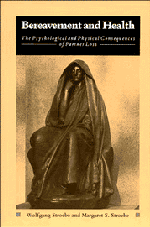Book contents
- Frontmatter
- Contents
- Preface
- 1 Introduction
- 2 The symptomatology of grief
- 3 Is grief universal? Cultural variations in the emotional reactions to loss
- 4 Depression models of grief
- 5 Stress models of grief
- 6 Mediators between stress and illness
- 7 The loss effect: health consequences of marital bereavement
- 8 Risk factors in bereavement outcome
- 9 Reducing the risk of poor bereavement outcome
- References
- Author index
- Subject index
3 - Is grief universal? Cultural variations in the emotional reactions to loss
Published online by Cambridge University Press: 03 May 2010
- Frontmatter
- Contents
- Preface
- 1 Introduction
- 2 The symptomatology of grief
- 3 Is grief universal? Cultural variations in the emotional reactions to loss
- 4 Depression models of grief
- 5 Stress models of grief
- 6 Mediators between stress and illness
- 7 The loss effect: health consequences of marital bereavement
- 8 Risk factors in bereavement outcome
- 9 Reducing the risk of poor bereavement outcome
- References
- Author index
- Subject index
Summary
Introduction
Following the description of the symptomatology of grief in the last chapter, this chapter explores the relationship between culture and grief, investigates whether the core of grief symptoms common to Western cultures can be demonstrated interculturally, and discusses the implications of cultural patterning of grief for the theoretical analysis of this emotion. Since psychologists typically lack the inclination or skills to conduct observational studies in a great variety of different cultures, we have to base our analysis of cultural variations in grief reactions on ethnographic data collected by anthropologists. This is problematic because emotional components of responses to death, of central interest to psychologists, are not directly the subject matter of anthropologists, who focus on public rituals or mourning customs (e.g., Durkheim, 1976; Huntington & Metcalfe, 1979; Radcliffe-Brown, 1964).
Can we draw any inferences about private grief experiences from such public display of mourning behavior? The answer to that question depends to some extent on the theory of emotion on which one's understanding of grief is based. If we conceive of emotional experience as the subjective reflection of a bodily state, then grief as the physiologically driven emotional response to loss can be clearly distinguished from the norm-governed public display of emotions involved in mourning. If, on the other hand, one accepts that the emotional experience is itself shaped by social norms, that both grief and mourning are socially constituted response patterns (Averill, 1982), then the study of mourning rituals may well provide valuable information on the nature of the grief experience in a given culture.
- Type
- Chapter
- Information
- Bereavement and HealthThe Psychological and Physical Consequences of Partner Loss, pp. 26 - 55Publisher: Cambridge University PressPrint publication year: 1987



